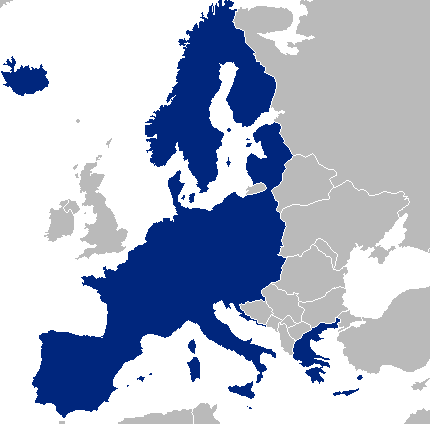The Schengen area is a group of countries in Europe that, since 1995, have officially abolished checking passports, as well as several other types of border patrol actions at their mutual borders. The group of countries includes Austria, Belgium, Bulgaria, Czech Republic, Croatia, Denmark, Estonia, Finland, France, Germany, Greece, Hungary, Iceland, Italy, Latvia, Liechtenstein, Lithuania, Luxembourg, Malta, Netherlands, Norway, Poland, Portugal, Romania, Slovakia, Slovenia, Spain, Sweden, and Switzerland.
The Schengen area is considered Europe’s ID-check-free travel zone. This means citizens from certain countries – including the United States – are generally allowed to travel freely between the 29 countries within the Schengen area for up to 90 days for tourism or business without a visa or a visa waiver (a visa waiver will be required for U.S. citizens, and those of several other countries, to enter the Schengen area in the future – currently May of 2025, although the date has been pushed back multiple times), or having to go through passport control to get between countries.
Bulgaria and Romania are the 2 newest countries to join the Schengen area – they’ve only been members since March of this year. However due to concerns of some Schengen countries regarding security issues surrounding the 2 countries, they were only voted into the area with the understanding that international travelers who were going from Bulgaria or Romania into other Schengen states via land crossings (car, rail) were still subjected to passport control measures.

However that will soon no longer be an issue. EU member states have voted that, as of January 1, 2025, they will remove checks on travelers at the internal land borders with and between Bulgaria and Romania. The two countries will then be fully integrated into the Schengen Zone.

Sándor Pintér, Hungarian Minister for Home Affairs, said:
It is a historic moment to finally welcome Bulgaria and Romania as full Schengen members. Lifting checks on persons at the internal land borders with and between those member states has been a top priority for the Hungarian presidency, and today we have made it a reality. This step will benefit not only Bulgarian and Romanian citizens, but also the EU as a whole.
Romanian President Klaus Iohannis called it a “natural and necessary step” that will significantly reduce wait times at borders, lower logistical costs for businesses, and attract foreign investors.
“Schengen membership has been a strategic objective for our country,” Johannis said in a statement. “Over time, there have been numerous obstacles, despite Romania’s technical readiness to meet Schengen standards for many years.”
He added that Romania would “continue to act responsibly to protect and strengthen the EU’s external borders.”
Feature photo (cropped): Manolo Gómez / flickr / CC BY 2.0 DEED
Want to comment on this post? Great! Read this first to help ensure it gets approved.
Want to sponsor a post, write something for Your Mileage May Vary, or put ads on our site? Click here for more info.
Like this post? Please share it! We have plenty more just like it and would love it if you decided to hang around and sign up to get emailed notifications of when we post.
Whether you’ve read our articles before or this is the first time you’re stopping by, we’re really glad you’re here and hope you come back to visit again!
This post first appeared on Your Mileage May Vary
